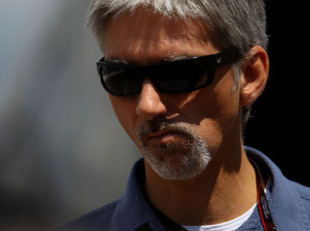- 5 minutes with ... Damon Hill
'It really is important to be unbiased'
Adam Hay-Nicholls May 20, 2010
Adam Hay-Nicholls talks to Damon Hill on the grid in Monaco about his connection with the circuit, the changes he's overseen at Silverstone, and making stewards decisions about Michael Schumacher before that last lap incident!
GPWEEK: How's this stewarding lark? Is it more difficult than it looks?
DAMON HILL: Well I think it could potentially be extremely difficult, but every incident has to be judged on its own. The problem is, like everything to do with applying the law, you have to start from the beginning and apply your best judgment. Until I find myself in that position I'm not able to say whether it's easy or not.
So far this year the stewards seem a bit more lenient than previously. Lewis Hamilton receiving a warning in Malaysia for weaving is a good example. If a driver bends the rules on occasion, or makes a silly mistake, do you think it's best to give them the benefit of the doubt?
Drivers are pretty clear on what they do and don't find acceptable. Having a driver on the stewards panel is a good move forward - someone who has been in that position, has that experience and is impartial.
I have no doubt that you'll be completely impartial, but it must be tempting to sock it to Schumi…
Well I think that if you're concerned about the way decisions are made, there's a good opportunity now for drivers to play a part in how those decisions come about. It really is important to be unbiased, and think of the sport first and how it appears to the world.
Obviously it's something people will be thinking about, whether or not it's possible to be completely neutral with drivers you've raced against. But I think you've got to be a bit more grown up about it than that. [At this point in the interview, FIA President Jean Todt interrupts to shake Damon by the hand…]
How do you think Mr Todt is getting on in his new role?
I think we've come through a phase in Formula One history that has been quite turbulent. Now things seem to have settled down and we're focusing again on racing. That's the way it should be. Before, [under Max Mosley] it was like having a film director who wanted to be in his own film.

Did you enjoy racing in Monaco?
Oh yes. Monaco is the biggest challenge of all of them, for a lot of reasons. The level of concentration is exceptionally high, the margin for error is nil and the penalty is maximum nearly every time. Webber has done a marvelous job here to be on pole and Kubica put in an amazing performance. It was qualifying as an art form.
It's a bit like a go-kart track. Do you feel you were at a disadvantage here, having not started in karts?
I think it did. I think some people are naturally suited to this kind of driving, although I don't think I ever worked out precisely what the right style was. Sometimes it worked, sometimes it didn't. I liked it when it was wet, and I got pole position in the dry. Certain drivers take to this place - it suits them - and others perhaps don't.
You came so close to winning in 1996 [when race leader Hill's engine exploded in the tunnel]. Does that still hurt?
It would have been lovely to have won the Monaco Grand Prix, but I won a lot of other races, and maybe I wouldn't have won those if I'd won that one.
Is Silverstone's new layout going to give us more overtaking?
I think it will be very spectacular to watch the cars at such high speed. I'm not sure whether it's ultimately nailed the overtaking issues. That could be more to do with the nature of the cars than anything else. We don't know, is the truth. We hope we've got it right, but we had to do what we had to do because Silverstone has to survive as a profitable business.
You must have been nervous when the first digger went in…
We don't like to lose traditional corners from race circuits, but nothing's the same forever.

